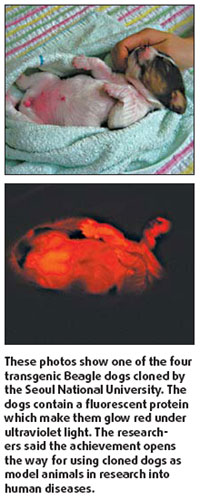Man's best friend begins to glow

SEOUL: South Korean scientists said yesterday they have created dogs that glow red by using a cloning technique that opens the way for research into human diseases.
The four cloned beagles known as Ruppy - Ruby Puppy - contain a fluorescent protein that makes them glow red under ultraviolet light. Even in daylight, their skin and claws appear pink.
Scientists said the creation of the glowing pups shows it will be possible to implant genes related to human diseases into dogs for research purposes.
"They are the world's first transgenic dogs," Professor Lee Byeong-Chun who leads the Seoul National University (SNU) team said.
"This means we'll be able to switch genes in dogs for genes related to human diseases such as Parkinson's Disease for research," he said, adding that dogs suffer from 224 illnesses that also afflict humans.
The team created the beagles by infecting dog fibroblast cells with a virus that inserted the fluorescent gene into the cell nucleus.
The nucleus was then transferred to another dog's egg cell whose nucleus had been removed. The cloned embryo was implanted in a surrogate mother.
Six female cloned beagles, all with a gene producing a fluorescent protein, were born in December 2007. Two died and four survived.
The experiment was only publicized this month.
"Fluorescent cats, mice and monkeys have been produced but dogs remain one of the most difficult animals for transgenic engineering while they have many diseases similar to humans," said Park Se-Pill, a cloning expert.
"This is an important achievement that paves the way for gene-targeting in dogs," Park said.
In December 2007 other South Korean scientists claimed a world first by manipulating a fluorescent protein gene to clone glowing cats.
Lee's team earlier produced the world's first cloned dog, Snuppy.
Lee was an aide to Hwang Woo-Suk, who was hailed as a national hero until an inquiry ruled that some of Hwang's work on cloning embryonic human stem cells was fake.
However, Lee's work in creating Snuppy (Seoul National University puppy) has been verified by the university and other authorities.
AFP
(China Daily 04/30/2009 page10)














